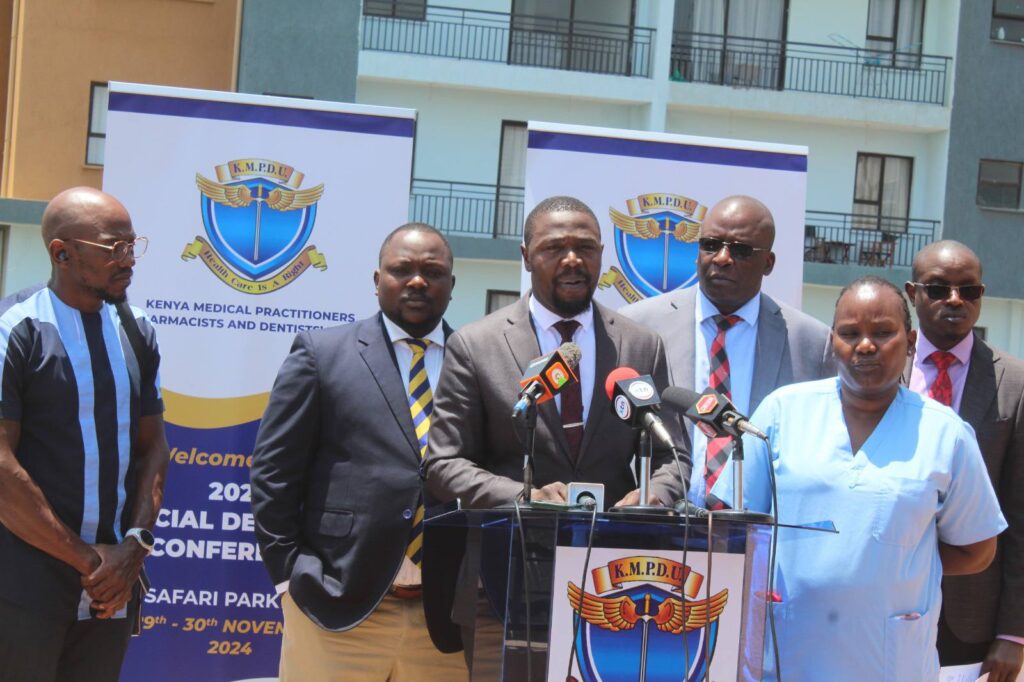
By Raphael Wanjala
Kenya’s public sector is on the brink of a significant disruption as civil servants, represented by various unions, have threatened to initiate a nationwide strike on March 18, 2025. The core of their grievances lies in the alleged inefficiencies and mismanagement of the newly established Social Health Authority (SHA), which has replaced the National Health Insurance Fund (NHIF).
The transition from NHIF to SHA was intended to streamline and enhance healthcare services for Kenyans. However, since its implementation, numerous challenges have surfaced, particularly affecting civil servants who rely on the Public Officers Medical Fund (POMF) managed by SHA. Hospitals nationwide have reportedly refused to treat patients under the POMF scheme due to non-payment of bills incurred by civil servants, amounting to billions of shillings. This situation has compelled many public servants to resort to fundraising to meet their medical needs, despite regular deductions from their salaries intended for healthcare coverage.
Growing Frustration Among Civil Servants
Tom Odege, Secretary-General of the Union of Kenya Civil Servants (UKCS), expressed deep concern over the current state of affairs. “Civil servants across the country are wasting valuable time chasing medical services while simultaneously being subjected to cash payment demands for the same,” he lamented. Odege emphasized that the unions are prepared to escalate the matter to a national strike within 30 days if a functional comprehensive medical insurance scheme is not reinstated.
Echoing these sentiments, Dr. Davji Atellah, Secretary-General of the Kenya Medical Practitioners, Pharmacists and Dentists Union (KMPDU), highlighted the urgency of the situation. “We are giving the government two weeks to resolve this issue once and for all. Failure to do so, we will call on all civil servants in both national and county governments to join a series of demonstrations starting March 18, 2025,” he warned.
The inefficiencies within SHA have had a ripple effect on healthcare services across the country. Clinical officers, who play a pivotal role in primary healthcare delivery, have been notably affected. Peterson Wachira, Chairman of the Kenya Union of Clinical Officers (KUCO), criticized the government for excluding clinical officers from the SHA claims approval system. This exclusion prevents them from accessing the SHA platform to offer care under Universal Health Coverage (UHC), forcing patients to pay out-of-pocket for services that should be covered. “A patient needing urgent care at a dispensary is now forced to pay or travel miles to a bigger hospital, yet we are qualified and available,” Wachira explained.
Government Response and Negotiations
In response to the escalating tensions, the government has engaged in negotiations with union representatives. On October 23, 2024, an agreement was reached to extend the comprehensive medical insurance scheme for public servants until November 21, 2024, through SHA. Public Service Cabinet Secretary Justin Muturi acknowledged the unions’ concerns and assured them of the government’s commitment to addressing the challenges faced during the transition from NHIF to SHA. “We will work with everyone involved to ensure that all civil servants, who are entitled to a medical cover, receive seamless delivery of services,” Muturi stated.
Despite these assurances, union leaders remain skeptical about the effectiveness of SHA’s leadership and the government’s commitment to fulfilling its promises. They argue that without tangible reforms and improved management, the healthcare system will continue to deteriorate, adversely affecting millions of Kenyans.
The financial strain on healthcare providers has been significant. Faith-based healthcare providers have issued a 14-day ultimatum to the government to settle the KSh 10 billion debt owed to them or require patients to pay cash for services.
Dr. Brian Lishenga, Chairman of the Rural and Urban Private Hospitals Association of Kenya (Rupha), stated that the decision to suspend SHA services was unavoidable to safeguard patient care and hospital sustainability. “This is not a decision we wanted to make but it has become unavoidable to safeguard patient care and hospital sustainability,” Lishenga remarked.
Broader Implications on Healthcare and the Economy
The looming strike and the issues surrounding SHA have attracted attention from political leaders. Kitutu Chache South MP Anthony Kibagendi criticized the government’s lack of a proper financing mechanism for public servants’ medical insurance schemes, highlighting the potential risks to healthcare providers, insurance companies, public health, and vulnerable groups. “A reduction in health insurance coverage may lead to a rise in the number of uninsured individuals, placing additional pressure on emergency services and public health systems,” Kibagendi noted.
The inefficiencies in SHA have also led to economic strains on the families of affected civil servants. Many public workers, who were once assured of medical coverage, are now forced to dig deep into their pockets for medical expenses. This financial burden has led to delays in accessing essential healthcare services, worsening health outcomes for many.
Private hospitals, which previously offered services under NHIF, have also raised concerns over the government’s ability to pay pending bills. The delays in payments have caused financial instability among healthcare providers, with some hospitals struggling to sustain operations. If the situation persists, more healthcare facilities may opt out of SHA, further limiting access to quality medical services for public servants and the general public.
Potential Strike and Its Consequences
As the March 18 deadline approaches, the government faces mounting pressure to address the concerns raised by civil servants and healthcare professionals. The potential strike threatens to paralyze public services and exacerbate the already strained healthcare system. The unions have made it clear that without immediate and effective reforms to SHA, industrial action is imminent. The coming days will be crucial in determining whether the government can avert the strike by implementing the necessary changes to restore confidence in the country’s healthcare system.
A nationwide strike by civil servants would have far-reaching consequences. Public offices, including those handling critical government functions such as immigration, tax collection, and education, could be severely disrupted. Additionally, if healthcare workers down their tools in protest, medical services could be significantly affected, potentially putting patients’ lives at risk.